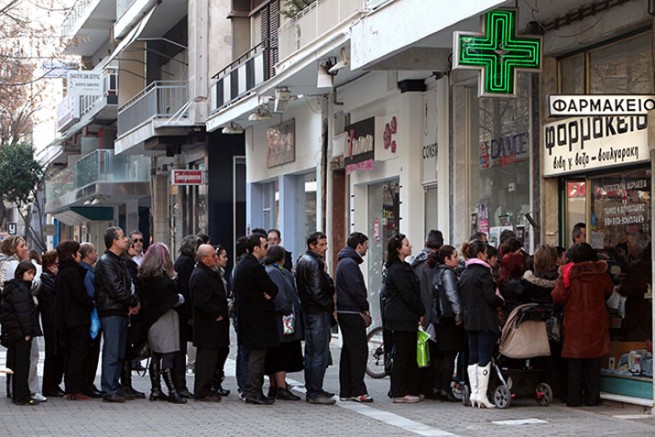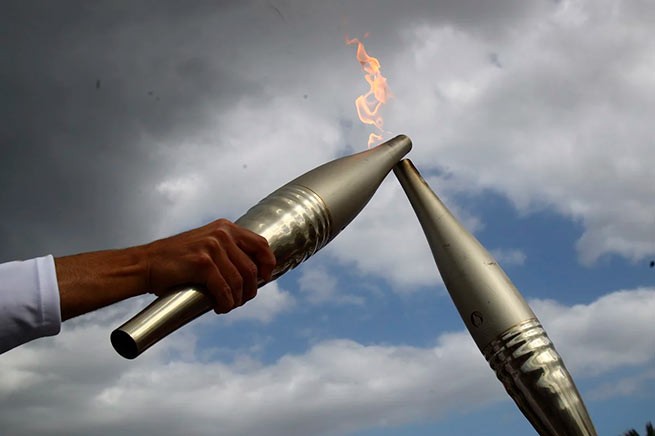Serious problems arose due to the shortage of medicines in Greece. A few hours ago, Minister of Health Thanos Playris organized a meeting with the relevant authorities and developed a package of ten measures to solve this problem.
At a time when seasonal viruses – the flu, RSV and others – are seeing a huge rise in incidence among children and adults, thousands of citizens across the country have gone on “safaris” in search of even simple, over-the-counter medicines for fever and cough. In parallel, there is a high demand for children’s medicines against the backdrop of a seasonal outbreak of diseases. The current situation is evidenced by the fact that on Christmas days children’s clinics were overcrowded due to influenza and coronavirus, which sent dozens of children to the hospital.
At the meeting held today (January 2), with the participation of representatives of ΕΟΦ, ΙΦΕΤ, ΠΕΦ, ΣΦΕΕ, ΠΦΣ and a representative of the Panhellenic Association of Pharmacists, the following decisions were made:
- Continued control of pharmacies over the ban export drugs in short supply, with punishment in the form of suspension of work in those pharmacies that do not cooperate or do not maintain a reserve.
- Continue monitoring pharmaceutical companies to ensure that they have enough medicines to cover the Greek market, especially antipyretics and pediatrics.
- Increase in orders from ΕΟΦ for active substances for which there is a global shortage.
- Information from ΕΟΦ about drugs that are not on the market, and at the same time information about where the replacement of drugs takes place. In this way, citizens will know that instead of a specific brand-name drug, a generic drug with equivalent effectiveness can be purchased.
- Expand the prescription of generic drugs where they are in short supply.
- Rationalize the prices of medicines that are underpriced and very low priced.
- The existence of continuous cooperation with pharmacists so that citizens can be better served when there is a shortage.
- Increasing the number of electronic prescriptions for elliptical drugs.
- Informing physicians of drug shortages so that prescribing can be adjusted to the appropriate therapeutic value.
- Finally, it was decided that the Greek pharmaceutical industry would run out of opportunities to increase the production of generic drugs, and multinational companies would increase the import of elliptical drugs.
Since mid-December, there has been a serious shortage of medicines in Greece amid a wave of virus outbreaks. At the same time, the threats of the Minister of Health against pharmaceutical warehouses, doctors and pharmacies directly do not help from the word “completely.”
According to media reports, there is a serious shortage of antipyretics, cough suppressants, inhalers, analgesics, cough syrups, as well as antibiotics for the treatment of acute respiratory diseases. Citizens report that pharmacists even shared the contents of a medicine box between two customers to meet demand.
Several people reported that pharmacies dispensed only one package of cheap depon per customer, others that they had to visit several pharmacies to find such a package. A pack of 20 tablets for fever and mild to moderate pain is priced at 2 euros.
The main reason for the lack of medicines, according to pharmacists, is the ever-growing parallel export. As Mr. Valtas points out, Greece is a country EU with the lowest prices for drugs, which makes their export very profitable for pharmacies. Significantly, the profits of pharmacies for the drugs they distribute, which in Greece is 4.67%, can be multiplied when the drugs are sold abroad. Thus, according to the catalogs distributed to interested parties, based on the price at which drugs are sold abroad, the profit is 189% for the very common drug Collirium, 106.7% for the asthma drug, 80% for the migraine drug, and muscle relaxant gain increases to 277%. It is worth noting that in 2020, medicines were exported in parallel in the amount of 427 million euros.
Pharmacies export large volumes to other countries EUwhere prices are higher, pharmacists say.
At the same time, as pharmaceutical companies see that the drugs they sell on the Greek market are circulating in Germany or France, where they sell their drugs themselves for much more, they are reducing the number of drugs they sell on the Greek market.

According to media reports, there is a serious shortage of antipyretics, cough suppressants, inhalers, analgesics, cough syrups, as well as antibiotics for the treatment of acute respiratory diseases. Citizens report that pharmacists even shared the contents of a medicine box between two customers to meet demand.
Several people reported that pharmacies dispensed only one package of cheap depon per customer, others that they had to visit several pharmacies to find such a package. A pack of 20 tablets for fever and mild to moderate pain is priced at 2 euros.
The main reason for the lack of medicines, according to pharmacists, is the ever-growing parallel export. As Mr. Valtas points out, Greece is a country EU with the lowest prices for drugs, which makes their export very profitable for pharmacies. Significantly, the profits of pharmacies for the drugs they distribute, which in Greece is 4.67%, can be multiplied when the drugs are sold abroad. Thus, according to the catalogs distributed to interested parties, based on the price at which drugs are sold abroad, the profit is 189% for the very common drug Collirium, 106.7% for the asthma drug, 80% for the migraine drug, and muscle relaxant gain increases to 277%. It is worth noting that in 2020, medicines were exported in parallel in the amount of 427 million euros.
Pharmacies export large volumes to other countries EUwhere prices are higher, pharmacists say.
At the same time, as pharmaceutical companies see that the drugs they sell on the Greek market are circulating in Germany or France, where they sell their drugs themselves for much more, they are reducing the number of drugs they sell on the Greek market.






More Stories
Meeting between Mitsotakis and Erdogan in Ankara on May 13
The Mitsotakis government paved the way for the recognition of the “Turkish Republic of Northern Cyprus” by recognizing Kosovo.
The strike is over – the streets in Athens are open